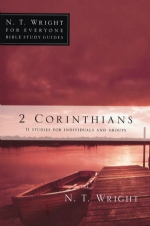$7.99
If you are already a Laridian customer, log in above and we can tell you if you own this product.
Preview Book
Preview the table of contents and a limited selection of text from this book.
 N.T. Wright for Everyone Bible Study: 2 Corinthians
N.T. Wright for Everyone Bible Study: 2 Corinthians

N.T. Wright for Everyone Bible Study: 2 Corinthians
$7.99
Buy It Once, Use It On These Platforms
About this Series
The widely respected pastor and New Testament scholar, N. T. Wright, walks you book by book through the entire New Testament in this series. Perfect for group use or daily personal reflection, these studies use the popular inductive method combined with Wright's thoughtful insights to bring contemporary application of Scripture to life.
About this Volume
Illness and suffering in the ancient world were regularly regarded as signs of divine displeasure. Sometimes we think the same thing. In 2 Corinthians we see evidence of Paul's own suffering. His enemies could easily think that God was punishing him for something. Not so, says Paul. These things come not because God is angry but because he wants us to trust him more fully. Paul was breaking new ground here. He wanted the Corinthians to understand the comfort to be found in the suffering, death and resurrection life of Jesus.
This volume also available as part of a money-saving bundle.
Features
- Includes suggestions for individual and group study (with leader's guide)
- Features the popular inductive Bible study method with notes and comments from a world-renowned New Testament scholar
- Designed specifically for lay people to facilitate contemporary application of Scripture
From the Preface
You watch from a distance as a friend walks down the street. You see him turn and go into a house. He strides in cheerfully and purposefully. You wait for a few minutes. Then you see him come out again--only now you see, to your horror, that he is limping, staggering along, with bruises on his face and blood trickling from one arm. Filled with concern, you also immediately want to know: what on earth happened in that house?
The historian, particularly the ancient historian, is often in the position of the puzzled spectator. The historian may have evidence about an early phase of someone's career, and then again a later phase; but what happened in between is often hidden. So it is with Paul. He has gone into the house, striding cheerfully along; we have watched him do so in his first letter to the Corinthians. Now in 2 Corinthians we see him emerge again, battered and bruised. Even his style of writing seems to have changed. But we don't know what happened inside.
Nor does he tell us what happened. Like many people in the ancient world, he was more interested in what illness or suffering meant than in giving us a detailed account of his symptoms. Most of what we know is in the opening of the letter; we can glean a little from things he says later in the letter, but it doesn't amount to much. He simply refers to "the suffering we went through in Asia" (the Roman province of "Asia" was roughly the western half of modern Turkey, with Ephesus in the middle of its west coast where Paul was staying when he wrote 1 Corinthians). Since his conversion (see Ac 9), Paul had been carrying the message of Jesus and the resurrection throughout the Mediterranean region, often with significant opposition and even violence. But what happened in Asia to cause him such distress?
The book of Acts doesn't help much at this point either. The riot that engulfed Paul in Ephesus that is described in Ac 19 may have been part of it. In that passage, things are quieted down by the city officials. But the opposition may have continued in new and nastier ways, leaving Paul feeling, as he says here, that he's received the sentence of death. In fact, his description sounds much like what we would call a nervous breakdown. The load had become too heavy.
The thing he doesn't mention explicitly, but which would be an important factor in his mind and that of his readers, is that illness and suffering in the ancient world were regularly regarded as signs of divine displeasure. Whatever Paul had gone through, it would have been easy for his enemies, or those who were jealous of him, to think to themselves that it probably served him right, that God was most likely punishing him for something or other. Not so, says Paul. These things come not because God is angry but because he wants us to trust him more fully. Paul was breaking new ground. He wanted the Corinthians to understand that this, too, was part of the earth-shattering implication of the gospel.Paul's theme throughout this letter is the strange royal comfort that comes from the suffering and death, and the new resurrection life, of Israel's Messiah, Jesus, the Lord of the world. This is the letter above all where he explores the meaning of the cross in terms of personal suffering--his own, and that of all the Messiah's people. If in Galatians he is angry, if in Philippians he is joyful, in this letter his deep sorrow, and the raw wounds of his own recent suffering, are very apparent. Yet he is determined to view all of his suffering and all of the troubles of the world through the lens of the gospel.
About the Author(s)
N. T. Wright, formerly bishop of Durham in England, is research professor of New Testament and early Christianity at the University of St. Andrews in Scotland. He was formerly canon theologian of Westminster Abbey and dean of Lichfield Cathedral. He also taught New Testament studies for twenty years at Cambridge, McGill and Oxford Universities. Wright's full-scale works The New Testament and the People of God, Jesus and the Victory of God and The Resurrection of the Son of God are part of a projected six-volume series titled Christian Origins and the Question of God. Among his many other published works are Surprised by Hope and Simply Christian.
System Requirements
Installed size (unless otherwise indicated): Approximately 412.125 KB. iPhone, iPad, and iPod touch Requires iPhone, iPod touch, or iPad running latest version of iOS. Download size: 412.125 KB. Android Requires Android OS 4.4 or later. Download size: 412.125 KB. Windows Requires Windows 10, 11 or later. Download size: 412.125 KB. macOS Requires macOS 10.13 or later. Download size: 412.125 KB.
The Fine Print
Copyright © 2010-2026 by Laridian, Inc. All Rights Reserved.
Laridian and PocketBible are registered trademarks of Laridian, Inc. DailyReader, MyBible, Memorize!, PrayerPartner, eTract, BookBuilder, VerseLinker, iPocketBible, DocAnalyzer, Change the way you look at the Bible, and The Bible. Anywhere. are trademarks of Laridian, Inc. Other marks are the property of their respective owners.
About You
- You are viewing the mobile version of our website.
- You are not logged in.
- Your IP Address: 216.73.216.171
- Site IP Address: 69.167.186.191
Social Media
Like and follow us on Facebook.
Stay Informed
We announce new products via email. If you ask to be removed from any of our mailings, you will not receive these notifications. If your email address changes, make sure you change it here, too.
From time to time we post things on our blog and on Facebook.
The Fine Print
Copyright © 2010-2026 by Laridian, Inc. All Rights Reserved.
Laridian, PocketBible, and MyBible are registered trademarks of Laridian, Inc. DailyReader, Memorize!, PrayerPartner, eTract, BookBuilder, VerseLinker, iPocketBible, DocAnalyzer, Change the way you look at the Bible, and The Bible. Anywhere. are trademarks of Laridian, Inc. Other marks are the property of their respective owners.
Products by Platform
Bible Reader Software
BookBuilder Software
- BookBuilder for Windows
- BookBuilder Pro for Windows
- BookBuilder for macOS
- BookBuilder Pro for macOS
- Self-Publishing Info
About Laridian
Products by Type
Your Account
- You are not logged in.
- Your IP Address: 216.73.216.171
- Site IP Address: 69.167.186.191
- Your Account Information
- Your Order History
- Your Downloads
- Your Notes, Highlights, and Bookmarks
- Your BookBuilder Books
- Your Shopping Cart
- Register Purchase from a Store
Best Ways to Get Help
You can get the fastest help by helping yourself.
- Make sure you download and install the PocketBible app that is required to read the Bibles or books you bought
- Read the confirmation email we send you when you make a purchase
- Read the help that's built into each of our products
- Look through our Frequently Asked Questions
- Submit a Support Ticket
- Email us at support@laridian.com






